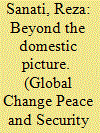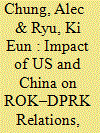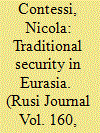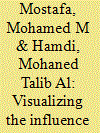|
|
|
Sort Order |
|
|
|
Items / Page
|
|
|
|
|
|
|
| Srl | Item |
| 1 |
ID:
131343


|
|
|
|
|
| Publication |
2014.
|
| Summary/Abstract |
This article examines the geopolitical determinants that have underpinned contemporary Iran-US relations, challenging the established thinking on why this relationship has been characterized by hostility. It is argued that the primacy that has been given to the role of domestic politics in either the US or Iran, as being the main arbiter of this relationship, is incomplete. This relationship is just as much a product of the structural conditions within the Middle East and the wider international system, which created the conditions for the clashing of the core national interests of both these states. However, due to the massive political and social alterations within the Middle East in the past decade, the notion of 'strategic irreconcilability' between both actors is now fundamentally changing. This has given room for a possible recalibration of the Iran-US relationship. Ultimately, it is argued that the synthesis of the domestic, the regional, and geopolitical levels of analysis are needed for a more holistic picture of the past, present, and future of Iran-US ties.
|
|
|
|
|
|
|
|
|
|
|
|
|
|
|
|
| 2 |
ID:
185893


|
|
|
|
|
| Summary/Abstract |
The relationship between the ROK and DPRK is bound to be affected by the two great powers—the US and China. Especially in recent decades, the power gap between the two great powers has continued to narrow. Given this, how is the geopolitical situation surrounding the Korean Peninsula shaping inter-Korean relations? This study uses event data and statistical analysis to explore the geopolitical factors that shaped inter-Korean relations from 1993 to 2019. We find that DPRK–ROK relations deteriorated as the power gap between the US and China narrowed. Also, inter-Korean relations were positive when DPRK–US relations were positive. In short, we conclude that during the shift in the US–China power distribution, maintaining positive DPRK–US relations while also managing inter-Korean relations peacefully is necessary for peace on the Korean Peninsula.
|
|
|
|
|
|
|
|
|
|
|
|
|
|
|
|
| 3 |
ID:
137945


|
|
|
|
|
| Summary/Abstract |
The brewing conflict over the division of resources located in the Caspian Sea has long been cited as a driver of the growth in naval capabilities of the five littoral states. However, to focus on this aspect would be to neglect the political and diplomatic advances of recent years, as well as other local and global geopolitical factors that have contributed to increased tension. Nicola Contessi explores the intricate dynamics at play in the region and the ongoing efforts to unpick them, arguing that while the 2014 Astrakhan Summit did not herald the breakthrough hailed by the five participants, it did mark a step towards resolution.
|
|
|
|
|
|
|
|
|
|
|
|
|
|
|
|
| 4 |
ID:
133582


|
|
|
|
|
| Publication |
2014.
|
| Summary/Abstract |
The aim of this paper is to investigate why some internal conflicts are terminated quickly, while others linger for several decades without a looming resolution in the horizon. In an attempt to achieve this objective, the role played by geopolitical factors in the Arab world's internal conflicts was investigated. More specifically, we used Kohonen self-organizing maps, an artificial intelligence-based neural network technique, along with event duration models to investigate the role played by distance from the capital, access to international borders, terrain, valuable natural resources such as oil, and rebels fighting capability in civil wars in the Arab world. Using recently validated data spanning more than 50 years of Arab civil wars (1948-2003), our findings indicate that previously ignored geopolitical factors seem to play an important role in the duration of internal conflicts in the Arab World.
|
|
|
|
|
|
|
|
|
|
|
|
|
|
|
|
|
|
|
|
|